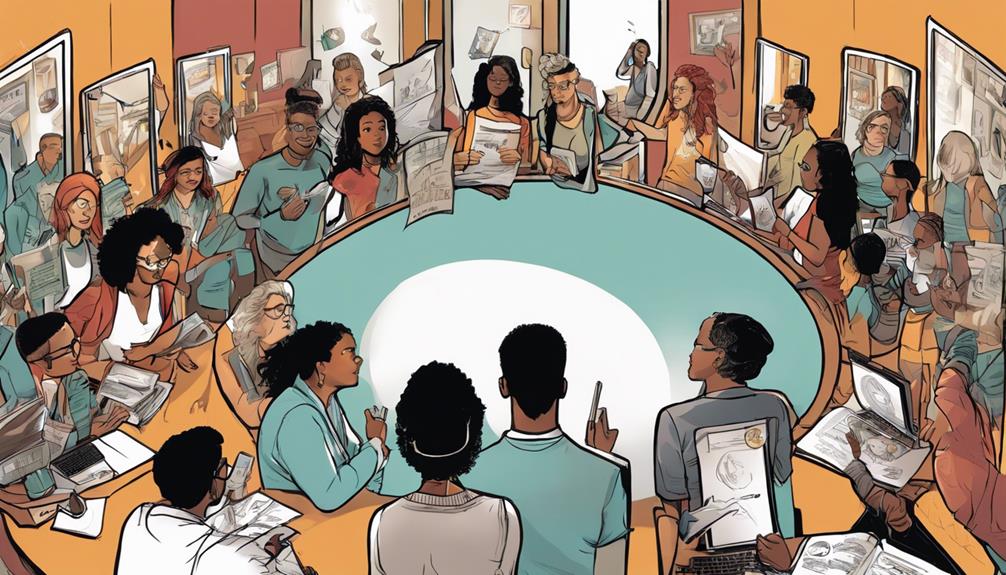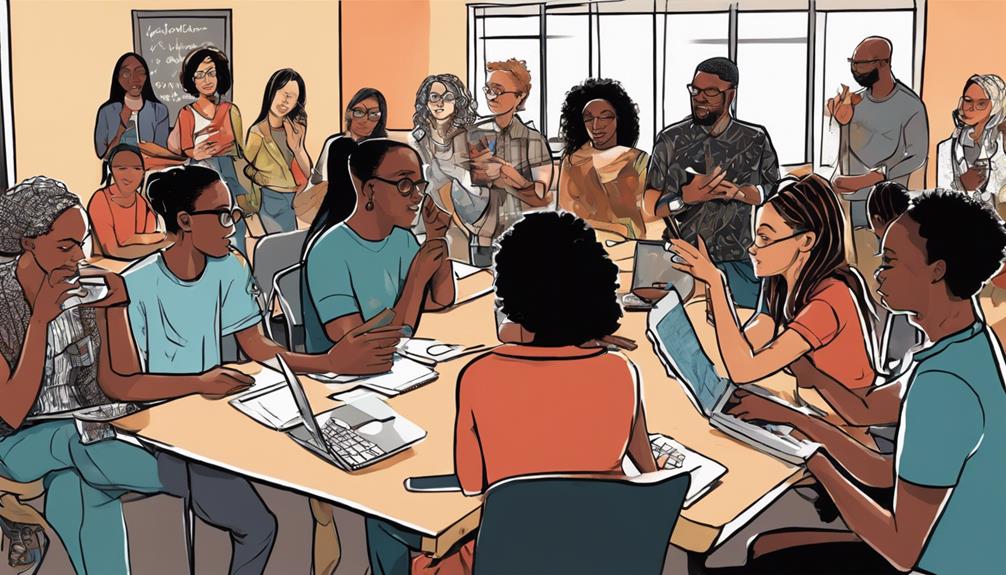Are you ready to unlock your potential as an educator? Dive into self-reflection! By reflecting on your teaching methods, embracing challenges, and celebrating successes, you will discover a path to empowerment. Keep a reflective journal to track your progress, engage in peer feedback for fresh perspectives, and establish goals for ongoing improvement. With increased self-awareness and problem-solving skills, you will inspire students, enhance classroom dynamics, and reignite your love for teaching. Explore the transformative journey of self-reflection to foster personal and professional growth. Empower yourself through introspection, and watch as your teaching practices thrive.
Key Takeaways
- Enhance self-awareness to identify strengths and areas for growth.
- Reflect on teaching strategies for continuous improvement.
- Use insights to tailor lessons and create a positive classroom environment.
- Boost motivation by celebrating achievements and overcoming challenges.
- Empower yourself professionally by engaging in reflective practices.
Importance of Reflective Practice

Reflection plays a crucial role in fostering progress and growth in both students and teachers alike. Taking the time to reflect allows you to explore deeply into your thoughts, feelings, and experiences, offering valuable insights for personal development.
For students, reflecting on past achievements and challenges can help set clear goals for the future. Teachers benefit from reflection by improving their teaching strategies, understanding student needs better, and enhancing classroom interactions. It's like looking in a mirror and seeing where you've been and where you want to go.
Effective Tools for Self-Reflection

Utilizing specific tools enhances your self-reflective practice, providing structured methods to explore your thoughts and experiences.
Here are five effective tools for self-reflection:
- Reflective Journals: Document your daily reflections, challenges, and successes.
- Mindfulness Exercises: Practice being present in the moment to enhance self-awareness.
- Peer Feedback: Seek input from colleagues to gain different perspectives on your actions.
- Goal Setting Worksheets: Use templates to outline short and long-term goals for self-improvement.
- Visualization Techniques: Picture your ideal self and reflect on steps to get there.
These tools offer diverse approaches to deepen your self-reflection journey and support your growth as an educator.
Advantages of Reflective Activities

Enhancing your self-reflective practice with effective tools can bring about numerous benefits and advantages. Engaging in reflective activities not only allows you to deepen your understanding of your teaching methods but also offers you a chance to grow both personally and professionally.
Here are some advantages of incorporating reflective activities into your routine:
- Improved Self-Awareness: Reflective activities help you become more attuned to your strengths, weaknesses, and areas for improvement.
- Enhanced Problem-Solving Skills: By reflecting on past experiences, you can develop better strategies to tackle challenges in the future.
- Increased Empathy: Understanding your own journey through reflection can make you more empathetic towards your students' struggles.
- Boosted Motivation: Reflecting on your achievements can reignite your passion for teaching and drive you towards setting new goals.
Through reflection, you can truly empower yourself as an educator.
Enhancing Teaching Through Reflection

Engage in thoughtful analysis of your teaching practices to cultivate continuous improvement and effectiveness. Reflecting on your teaching methods can lead to profound changes in your classroom dynamics and student engagement.
Here are five ways reflection can enhance your teaching:
- Identify areas for improvement and growth opportunities.
- Evaluate the effectiveness of different teaching strategies.
- Enhance student learning by adjusting lesson plans based on reflections.
- Foster a positive classroom environment through self-awareness.
- Develop a deeper understanding of student needs and tailor your approach accordingly.
Engage in the Online Community

Connect with like-minded educators and expand your professional network by joining the online community today. Engaging with platforms like Twitter, Facebook groups, or educational forums allows you to share experiences, gain insights, and collaborate with teachers from around the world.
You can participate in discussions on teaching strategies, classroom management tips, and innovative educational practices. By connecting online, you open yourself up to a wealth of resources, ideas, and support that can enhance your teaching journey.
Whether you're seeking advice on a challenging student or looking for new lesson ideas, the online community offers a space where educators can come together to learn, grow, and inspire each other.
Frequently Asked Questions
How Can Self-Reflection Benefit Both Educators and Students?
Reflect on your teaching practices to understand students better, foster deeper discussions, and set achievable goals. Self-reflection informs planning, encourages growth, and leads to significant positive changes in both educators and students.
What Specific Activities Can Aid in Effective Self-Reflection?
Wondering what activities can aid in effective self-reflection? Try inquiry-based approaches, use tools like M.E.N.D.T.G or B.W.L.F.G, reflect on emotions, time travel, and goals. Utilize reflective journals for deeper insights and growth.
How Does Self-Reflection Positively Impact Teaching Practices?
Reflecting on teaching practices positively impacts you by enhancing self-awareness, improving instructional strategies, and fostering continuous growth. Through introspection and feedback, you can make informed decisions, refine your approach, and ultimately elevate your teaching effectiveness.
What Are Some Unique Benefits of Engaging in Reflective Activities?
When engaging in reflective activities, you reveal a treasure trove of insights. Discover hidden gems of wisdom, gain clarity, and pave the way for growth. Self-reflection offers a mirror to your soul, guiding you towards greatness.
How Can Educators Connect With the Online Community for Support and Resources?
To connect with the online community for support and resources, you should join platforms like Facebook and Twitter. Engage with educators like Richard James Rogers to stay updated on giveaways, special offers, and events for valuable insights and connections.
Conclusion
As you commence on this self-reflection journey, imagine yourself as a caterpillar transforming into a beautiful butterfly. Through introspection and growth, you'll spread your wings as an empowered educator, ready to inspire and uplift your students.
Join our online community and soar to new heights together. Embrace the power of reflection, and watch as it revolutionizes your teaching practice, creating a vibrant and enriching learning environment for all.
The sky's the limit, so spread your wings and fly!










